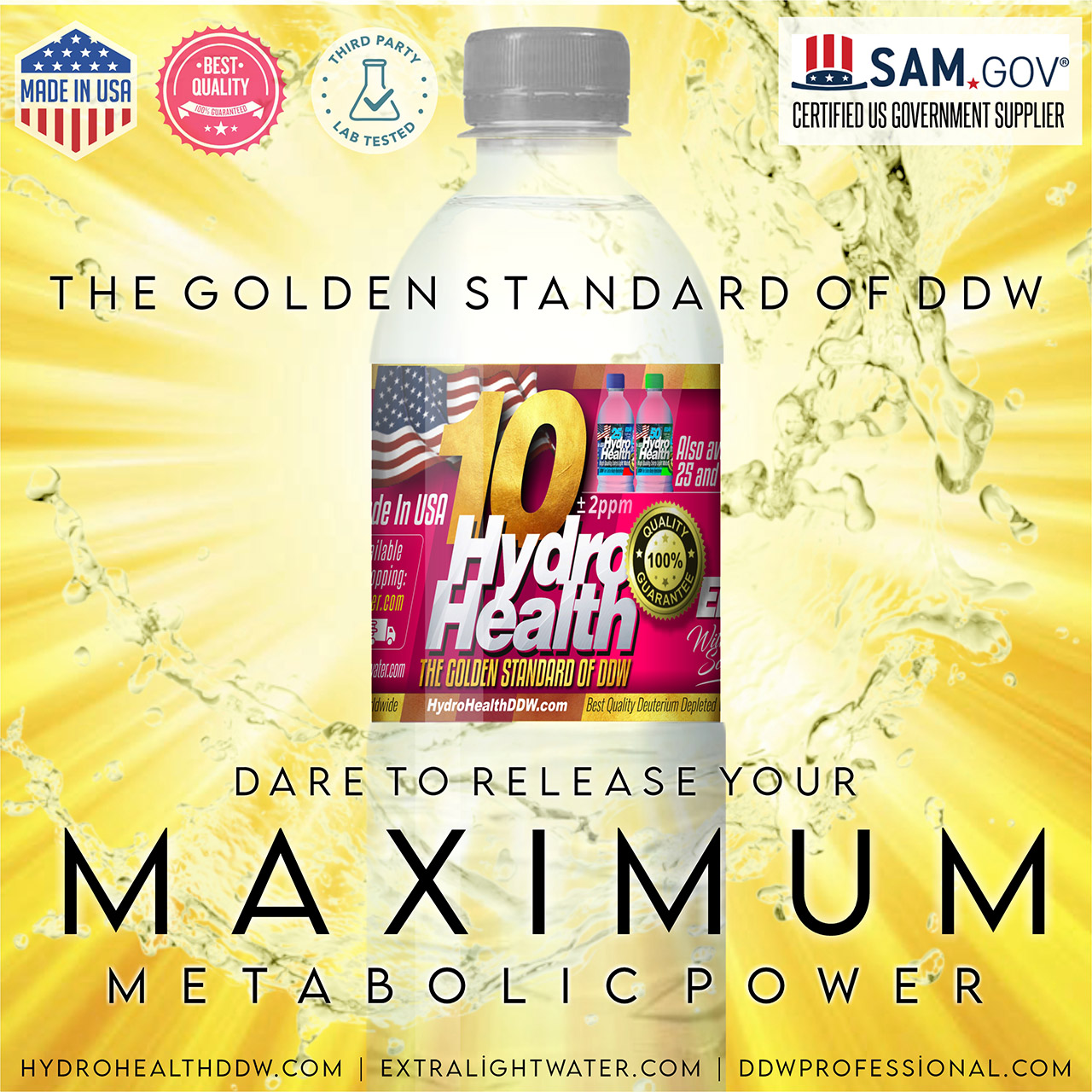DDW Benefits Explained: How To Optimize Your Health And Harness The Body’s Innate Ability To Heal
“Mitochondria is key to self-healing and mitochondria love deuterium-depleted water”
Mitochondria, often referred to as the powerhouses of the cell, play a crucial role not only in energy production but also in maintaining overall cellular health and facilitating self-healing processes within the body.
As our understanding of cellular biology evolves, it becomes increasingly clear that the health of our mitochondria directly influences our ability to recover from injuries and illnesses.
One fascinating aspect of this relationship is the impact of deuterium-depleted water—a unique form of water that has been shown to enhance mitochondrial function and promote healing.
By exploring the intricate connections between mitochondria, self-healing mechanisms, and the benefits of deuterium-depleted water, we can uncover valuable insights into how to optimize our health and harness the body’s innate ability to heal.
- Introduction to Mitochondria and Self-Healing
- Understanding Mitochondrial Function and Health
- The Role of Mitochondria in the Healing Process
- Deuterium-Depleted Water: What It Is and Its Benefits
- The Connection Between Mitochondria and Deuterium-Depleted Water
- Scientific Studies Supporting Mitochondrial Health and Water Quality
- Practical Applications: How to Enhance Mitochondrial Function
- Conclusion: Embracing Mitochondrial Health for Optimal Healing
Introduction to Mitochondria and Self-Healing
About Mitochondria and Their Importance
Ah, mitochondria—the tiny powerhouses of the cell. If cells were a rock band, mitochondria would be the lead guitarist, bringing the energy that fuels every great performance. These little organelles are responsible for generating adenosine triphosphate (ATP), the energy currency of our cells. Without mitochondria, we’d be like a smartphone without a battery: functional but utterly useless. They also play crucial roles in regulating metabolic pathways, signaling, and even cell death. So, when it comes to self-healing, mitochondria aren’t just important; they’re absolutely essential!
The Concept of Self-Healing in Biological Systems
Now, let’s take a moment to appreciate the wonders of self-healing. The concept refers to the ability of biological systems to recover from injury, restore balance, and maintain homeostasis. It’s akin to how your body heals a paper cut: your cells jump into action, working tirelessly behind the scenes. However, this self-healing magic relies heavily on the efficiency of our mitochondria. When these powerhouses are functioning optimally, they help provide the energy our cells need to repair and regenerate. It’s like having a personal cheerleader who keeps the healing party going strong!
Understanding Mitochondrial Function and Health
Energy Production: The Role of ATPATP is like the currency of life—spending and earning energy as we go about our daily activities.
Mitochondria convert nutrients from food into ATP through a process called oxidative phosphorylation. In simpler terms, it’s like turning a big ol’ pile of leftovers into a gourmet meal. When our mitochondria are healthy and working efficiently, ATP production skyrockets, giving us the energy we need to power through anything from running a marathon to binge-watching our favorite series.
Mitochondrial DNA and Its Implications
Mitochondria come with their own set of DNA, which is separate from the nuclear DNA that dictates most of our genetic traits. This mitochondrial DNA (mtDNA) is inherited from our mothers, and it plays a crucial role in how well our mitochondria function. If mtDNA is damaged, which can happen due to various environmental factors or aging, it can lead to impaired energy production and a host of health problems. It’s like passing down your mom’s old sweater—if it’s in good condition, it’ll keep you warm; if not, well, you’re in trouble!
Factors Affecting Mitochondrial Health
Mitochondrial health isn’t on autopilot; it’s affected by various lifestyle choices. Factors like water quality, diet, exercise, stress levels, and even exposure to toxins can impact how well our mitochondria generate energy. Think of it as a delicate ecosystem: feed it nutrient-rich foods and engage in regular exercise, and you’ll have a thriving community of energetic mitochondria. Neglect it with junk food and couch potato habits, and you’ll end up with a bunch of cranky organelles ready to throw in the towel.
The Role of Mitochondria in the Healing Process
Mitochondrial Dynamics and Repair Mechanisms
Mitochondria aren’t just passive power suppliers; they are dynamic creatures capable of fission and fusion. This means they can split apart and come together to adapt to the energy demands of the cell. When a cell is injured, mitochondria can help in the repair process by directing energy to where it’s needed most. It’s like a well-organized team that knows how to shift roles during a game to ensure victory. The better the mitochondria adapt and respond, the more effective the healing process will be.
How Mitochondria Influence Cellular Functions
Mitochondria have a say in more than just energy production; they also influence numerous cellular functions, including apoptosis (programmed cell death), inflammation, and immune response. This makes them key players in self-healing. When mitochondria operate optimally, they can help regulate inflammation and support the immune system, effectively keeping the body’s healing processes in check. You might say they’re the unsung heroes, quietly orchestrating the healing symphony while we take all the credit.
Deuterium-Depleted Water: What It Is and Its Benefits
The Science Behind Deuterium and Its Effects
Enter deuterium, a naturally occurring isotope of hydrogen that, while harmless in small amounts, can be detrimental to our cellular processes when present in excess. Think of it as that one friend who always shows up at parties uninvited and drinks all your soda. Water with lower levels of deuterium—known as deuterium-depleted water (DDW)— can make a significant difference. It enhances mitochondrial function and energy production, providing your cells the VIP treatment they deserve.
Health Benefits of Deuterium-Depleted Water
Drinking deuterium-depleted water might sound like the latest trend in wellness, but the science behind it is compelling.
Research shows that DDW can improve metabolism, enhance energy levels, and most importantly, support the body’s self-healing abilities.
Imagine sipping on a refreshing beverage that not only hydrates you but also gives your mitochondria a little boost—it’s like giving your cells a delightful spa day!
So, while you’re out there trying to live your best life, consider adding DDW to your routine— it just might help your mitochondria get their groove back!
The Connection Between Mitochondria and Deuterium-Depleted Water
How Deuterium Levels Affect Mitochondrial Efficiency
Mitochondria— the tiny powerhouses of our cells that keep us buzzing with energy! But did you know they can be picky about their drinking habits? Enter deuterium, a heavier isotope of hydrogen. When the levels of deuterium in our water are too high, as it is the case with tap water or mineral water (yes, even the expensive ones!) it can slow down our mitochondria’s energy production. Imagine trying to run a marathon with a backpack full of bricks—that’s what high deuterium levels can feel like for our cellular power plants. Conversely, deuterium-depleted water acts like a refreshing energy drink for mitochondria, allowing them to work more efficiently and optimally. So, if you want your energy levels to soar like a caffeine-fueled squirrel, you might want to consider switiching to water with lower deuterium content. And HydroHealth DDW is the best deuterium-depleted in the world!
Research Findings on Water Quality and Mitochondrial Function
Recent research has started to shed light on the intricate relationship between water quality and mitochondrial function. Studies have shown that water rich in deuterium is linked to various metabolic disorders and sluggish cellular performance. This suggests that quality matters—after all, you wouldn’t fuel a sports car with bad gas, right?
In contrast, researchers have found that deuterium-depleted water can enhance mitochondrial function, leading to increased ATP production (that’s the energy currency of our cells). So, if you’re trying to channel your inner Energizer Bunny, choosing HydroHealth DDW might just be the ticket!
Scientific Studies Supporting Mitochondrial Health and Water Quality
Key Studies on Mitochondrial Function
In the world of science, nothing beats the credibility of key studies to back up our claims. One notable research project highlighted how cellular energy levels improved significantly in subjects consuming deuterium-depleted water.
This study showcased electrochemical measurements of mitochondria, revealing a clear improvement in ATP synthesis. Other investigations have pinpointed a direct link between optimal deuterium levels and improved overall health markers. So, it seems our little mitochondria aren’t just making energy—they’re thriving when given the right kind of water!
Scientists and medical doctors show that some of the benefits of drinking DDW include:
-
Boosting immune system and detox
-
Boosting glucose metabolism
-
Increasing metabolic rate
-
Protective effects for heart and liver
-
Helps fight depression
-
Adjuvant in cancer treatment
-
Improves sport performance
-
Delay aging
The Impact of Water Composition on Cellular Health
Water is essential for life, but its composition is like a secret recipe for cellular health. Various studies indicate that the minerals and isotopes in water can affect everything from hydration levels to cellular repair mechanisms. Deuterium-depleted water is key in reversing mitochondrial dysfunction and enhancing metabolic activity, paving the way for a healthier body. Who knew something as simple as water could hold the key to such dynamic cellular processes?
Practical Applications: How to Enhance Mitochondrial Function
Dietary Considerations for Mitochondrial Support
Hydration: Choosing the Right Water for Health
Not all water is created equal, especially when it comes to mitochondria. Choosing deuterium-depleted water can give your cells a lift and boost energy levels. If you’re considering a new hydration strategy, look no further: choose HydroHealth DDW, the only deuterium-depleted water made in the USA, super-certified, lab tested and microbiologically pure – already recommended by medical practitioners!
Remember, hydration is key—just make sure the water you’re drinking is helping your mitochondria rather than weighing them down!
When it comes to supporting your mitochondria, your diet plays a starring role!
Foods rich in antioxidants (think berries, dark chocolate, and colorful veggies) help reduce oxidative stress, giving your mitochondria a fighting chance. Additionally, healthy fats from sources like avocados and olive oil can provide essential fatty acids for optimal energy production. So, while chocolate cake might not be on the mitochondrial support list (sorry, folks), it’s all about balance. Let’s just say your mitochondria would appreciate a few more greens alongside those indulgences!
Lifestyle Changes to Boost Mitochondrial Efficiency
Mitochondrial support isn’t just about water and food. Incorporating regular exercise, managing stress, and getting plenty of sleep can dramatically improve mitochondrial efficiency. Exercise, in particular, boosts mitochondrial biogenesis (that’s the fancy term for creating new mitochondria), while meditation and adequate sleep reduce stress hormones that can impede mitochondrial function. Basically, treat your mitochondria like the VIPs they are, and they’ll reward you with energy aplenty!## Conclusion: Embracing Mitochondrial Health for Optimal Healing
Summarizing Key Takeaways
To wrap it all up, the connection between mitochondria and deuterium-depleted water is a burgeoning area of interest that underscores the importance of cellular health. By ensuring a diet rich in antioxidants, choosing high-quality water, and adopting healthy lifestyle habits, you’ll be well-equipped to enhance your mitochondrial function. Remember, a happy mitochondrion is a productive mitochondrion!
Future Directions for Research and Health Practices
The exciting journey doesn’t end here! As research continues to progress, we can expect even more insights into how water quality and mitochondrial health impact overall well-being. There’s a lot to uncover regarding the intricate dance between our cells and the water we consume.
So, keep your eyes peeled— it’s a thrilling time to be part of this scientific adventure, and your mitochondria will thank you for it!
In conclusion, the relationship between mitochondria and self-healing is a vital aspect of our overall health and well-being. By understanding the role of mitochondria in energy production and their influence on healing processes, we can appreciate the significance of supporting mitochondrial health. Incorporating deuterium-depleted water into our daily routines may offer additional benefits, enhancing mitochondrial function and promoting recovery. As we continue to explore these connections, adopting practices that nurture our mitochondria can empower us to take charge of our health and unlock our body’s remarkable ability to heal itself.
Frequently Asked Questions (FAQ)
What are mitochondria and why are they important for self-healing?
Mitochondria are organelles found in almost all cells, responsible for producing energy in the form of ATP through cellular respiration. They play a crucial role in cellular health, influencing processes such as inflammation, apoptosis, and overall metabolic function, which are essential for effective self-healing.
What is deuterium-depleted water and how does it benefit mitochondria?
Deuterium-depleted water is water that has a lower concentration of deuterium, a stable isotope of hydrogen. Reducing deuterium levels will enhance mitochondrial efficiency, improve energy production, and support overall cellular health, which may aid in healing processes.
How can I incorporate deuterium-depleted water into my routine?
HydroHealth Deuterium-depleted water can be purchased from Walmart, Amazon EBay, Etsy and directly from the manufacturer’s shop, HERE.
It can be consumed like regular water throughout the day. Additionally, focusing on a diet rich in natural foods and low in processed items can help maintain hydration and support mitochondrial function.
Are there any risks associated with drinking deuterium-depleted water?
Deuterium-depleted water is safe for consumption. However, it’s always best to consult a healthcare professional before making significant changes to your diet or hydration practices, especially for individuals with specific health conditions or concerns.
WANT TO SAVE THIS ARTICLE?
CLICK ON THE LINK BELOW TO SAVE IT ON YOUR DEVICE AS PDF
How To Optimize Your Health By Switching To Deuterium-depleted Water











